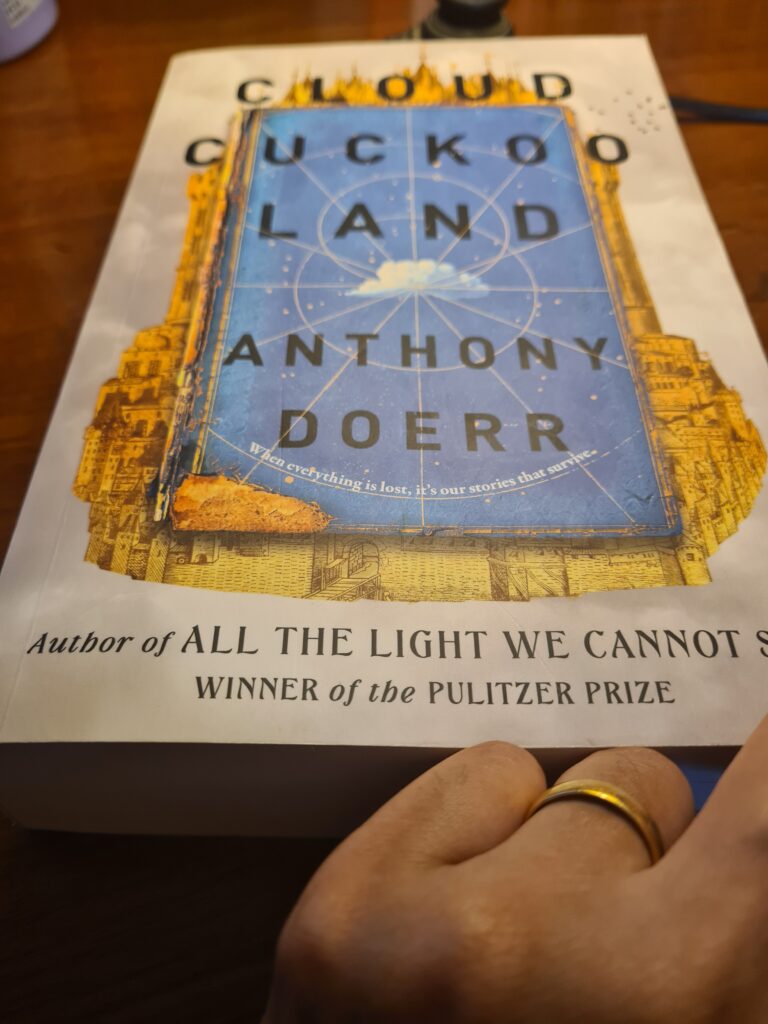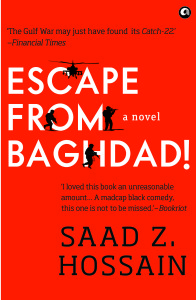“Cloud Cuckoo Land” by Anthony Doerr

She works as much from memory as from the manuscript, and inside the little stone cottage, something happens: the sick child is in her lap, his forehead sheened with sweat, opens his eyes. When Aethon is accidentally transformed into an ass and the other boys burst into laughter, he smiles. When Aethon reaches the frozen edge of the world, he bites his fingernails. And when Aethon finally reaches the gates of the city in the clouds, tears sprint to his eyes.
The lamp spits, the oil drawing low, and all three boys beg her to go on.
“Please,” they say, and their eyes glitter in the light. “tell us what he saw inside the goddess’s magical book.”
“It sat,” she says, “on a golden pedestal so ornate it looked as if it were made by the smith-god himself. When Aethon peered into it, as though into some magical well, he saw the heavens and the earth and all its lands scattered around the ocean, and all the animals and birds upon it. The cities were full of lanterns and gardens, and he could faintly hear music and singing, and he saw a wedding in one city with girls in bright linen robes, and boys with gold swords on silver belts, jumping through rings, doing handsprings and leaping and dancing in time. But on the next page he saw dark, flaming cities in which men were slaughtered in their fields, their wives enslaved in chains, and their children pitched over the walls onto pikes. He saw demons, and hounds eating corpses, and when he bent his ear low to the pages, he could hear the wailing. And as he looked, turning the leaf over and back, Aethon saw that the cities on both sides of the page, the dark ones and the bright ones, were one and the same, and he was afraid.”
The lamp sputters out; the chimney moans; the children draw closer around her. Omeir rewraps the book, and Anna holds their youngest son against her breast, and dreams of bright clean light falling on the pale walls of the city, and when they wake, late into the morning, the boy’s fever is gone.
Anthony Doerr’s Cloud Cuckoo Land ( HarperCollins India) is his first novel in seven years. It flits between three periods of history — past is 1450s Constantinople, the clash between Christianity and Islam and is a story of young Anna and Omeir; the present is in the twenty-first century and is primarily about Zeno Ninis, an eighty-six-year-old veteran of the Korean war who has made it his life’s mission to translate Diogenes’s book on Aethon and later help a bunch of fifth graders stage a dramatised version of it at their local library; and the future is of young Konstance who believes she is many millions of miles away from Earth, on a starship, in a community of modified humans. Time is measured in terms of “Mission Years”. The common thread running through these three stories is Aethon’s story.
Anna first discovers the Greek manuscript in an abandoned monastery in Thessaly and steals it, hoping to sell it to a bunch of men who have come from Urbino. Their lord and Count dreams of “erecting a library to surpass the pope’s, a library to contain every text ever written, a library to last until the end of time, and his books will be free to anyone who can read them.” Anna steals it but then discovers that the men from Urbino have fled upon hearing news of impending war. So, she keeps the book. Over time, she discovers the power of storytelling as she reads out the ancient Greek script to her sons and illiterate husband, Omeir. The family is convinced it has a healing power especially after seeing the positive effect it has on the sick children as their mother reads out aloud from the text. After Anna’s death, Omeir decides to take the book to Urbino as a gift to the Count. He remains clueless to its import but realises that it must be special enough for Anna to have treasured it for so long.
Zeno Ninis, on the other hand, while a prisoner of war befriends a British soldier, Rex, who is a scholar of the Classics. Rex teaches Greek to Zeno by scribbling in the sand or in the frost in their prison camp. Over time, once they have returned to their respective homes, Zeno finds refuge in the library at Lakeport, Idaho. He associates it with comfort and security ever since the two sisters who were the librarians too, welcomed him as a child. Zeno returns to it as an adult, a veteran, and begins to translate. All the while Rex’s words haunt Zeno: “I know why those librarians read the old stories to you. Because if it’s told well enough, for as long as the story lasts, you get to slip the trap.” While involved in the task of translating Aethon’s story, the current librarian requests Zeno to help manage the kids by narrating the story of his book. The kids are enthralled. So much so that they decide to stage a play based on the script. They are undeterred by the fact that large chunks of the original text are missing or are faded. Zeno has to use his imagination to supply the bridges in the narrative. In this he is ably supported by the kids who happily scribble in the margins, offering Aethon the explorer, new lines such as “The world as it is is enough.” Perceptive comment out of the mouth of babes!
Konstance is a young girl, living on the ship, Argos. She is not permitted to access the library on board unless she reaches a certain age. When she does, she goes through an initiation ceremony witnessed by many aboard the ship. Ultimately, she is given access using VR technology that enables her to browse through shelf after shelf of books, most of which come flying to her. If she wishes to “read” any, the characters pop out like a pop-up book but are holograms that are as wispish and transparent as air. The only book that seems to fascinate Konstance is the Atlas for which she is mocked by her peers. They say it is old fashioned but Konstance is charmed by the fact that by walking into its pages she discovers new parts of the world, cultures, its histories and geographies. Her curiosity is also kindled by the blue and gold hardback on her father’s night table. It is a copy of Zeno Ninis’s transslation. Slowly, she begins reading it and transcribing it for herself. It influences the way she thinks. Unlike her community, Konstance and to some extent, her father, are the only two who query or have independent thoughts. They do not necessarily follow the herd mentality. Even the super computer Sybil dissuades Konstance from spending too much time in the library. But she is curious and wants to investigate the events of February, 20, 2020. “Who were the five children in the Lakeport Public Library saved by Zero Ninis?”
An incident had occurred at the library when a young man, probably autistic, Seymour, walked into the library with the intention of blowing it up. He had a bag full of crude homemade bombs. He was extremely distressed at the destruction to Nature, especially habitats of owls, whom he felt close to. He understood the intricacies of climate change and was convinced that man and his destructive sensibilities were destroying Earth. By blowing up the library Seymour hoped to make a statement. But he had not reckoned with Zeno being at the library.
In Cloud Cuckoo Land, a story that has survived centuries about Aethon continues to be passed on from generation to generation, even via translations. In fact, the three storylines are interspersed with excerpts of Zeno Nini’s translation of the text. The length varies from a few broken sentences to paragraphs. Doerr makes a sly comment on the art of translation too when Konstance is browsing through the library:
The translations…mostly bewilder: either they’re boring and laborious, spangled with footnotes, or they’re too fragmented to many any sense of.
Even Doerr becomes more and more adept at telling Aethon’s story with every passing page. Almost as if he is practising what he feels, stories have the capacity to live beyond their original tellers.
Doerr’s Cloud Cuckoo Land is a term borrowed from Aristophanes The Birds written in 414 B.C., almost 2500 years ago. It describes a mythical city based in the clouds. But more than the referencing by a modern storyteller to an ancient storyteller, it is the testimony to the astonishing staying power of storytelling. The ability to stick. The ability to be retold. The ability to be shared and become one with the narrator. The tenacity of stories is evident in how they intermingle with the memories of the person. More importantly, the stories become a repository of hope and goodwill. It reminds the listeners that as time moves on, life goes on too. Destruction of nature, communal wars, and marauding armies happen. But at the same time, stories record moments of joy, happiness, beauty and splendour. Books like men die. They need nurturing. Yet, books have the uncanny ability of outliving their creators if they are left with those who respect the printed books. It is possible. It is this insistence of Doerr upon the tangible object rather than the excitement at having millions of books at our fingertips in a digital library that is so comforting, given that we ourselves live in a time where digital formats are being peddled as superior to print. But it is not always the case, is it? With digital rights management and other requirements of upgrading hardware and software to access a digital format, and the recurring cost involved in keeping the information accessible, it is the print format that reigns supreme — it is a one-time cost, it is inherited, it develops a sentimental value that is precious to the owners as it the physical book offers a connect to their ancestors, and finally, as it is passed on from generation to generation, it influences the hearts and minds of others. Digital formats, in comparison, are sterile. Books transmit ideas. They make us think for ourselves.
Cloud Cuckoo Land is a triumph. It is definitely an ode to libraries and books, the printed format vs digital. But it is also a prayer, a belief in the nourishing power of storytelling. It is Anthony Doerr’s first novel in seven years, his first since winning the Pulitzer Prize (2015) for the exquisite All the Light We Cannot See (published, 2014). His critically-acclaimed 2014 novel All the Light We Cannot See sold 1.8 million copies across editions in British Commonwealth and 9.3 million copies worldwide. The publishers will be selling many copies of Cloud Cuckoo Land despite its bulk as the story is so rejuvenating and astonishingly relevant at the same time. Many will buy the book as it is the first novel since Doerr won the Pulitzer Prize but this book will attract many new readers. It is to be released on 28 Sept 2021.
Get it!

